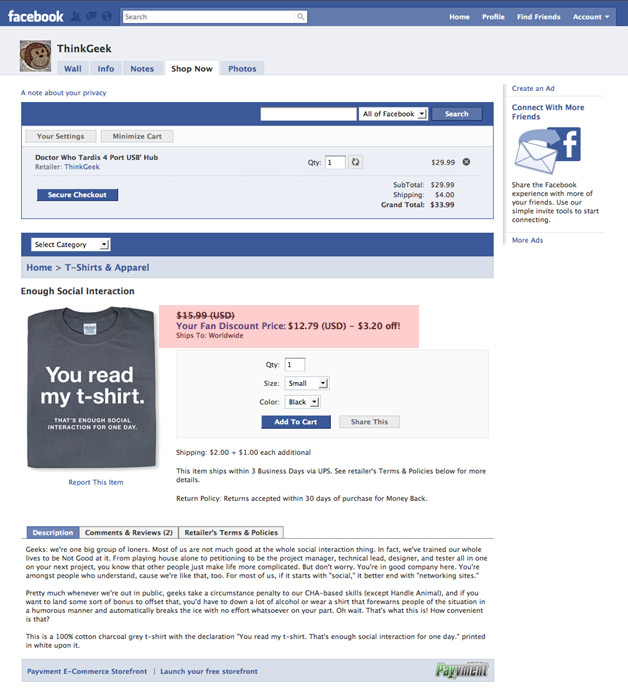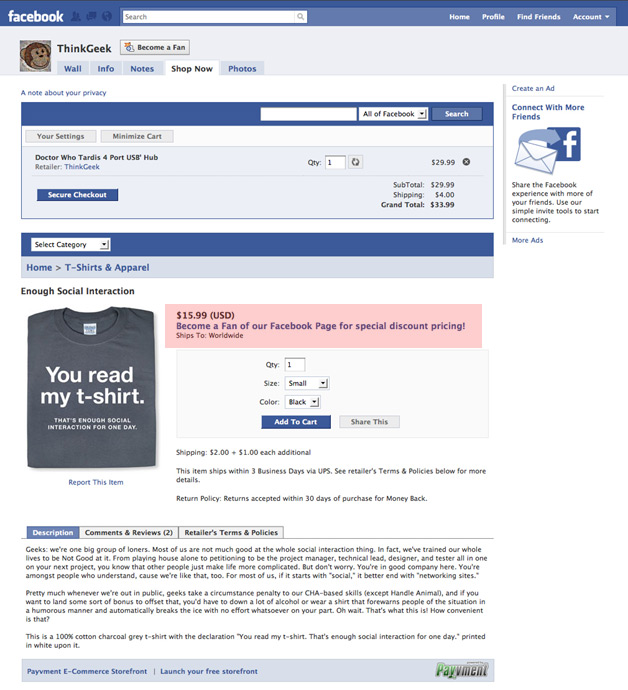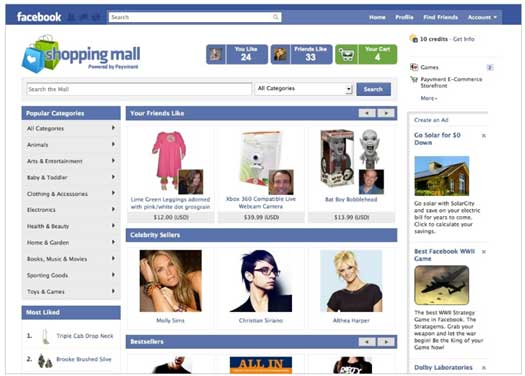It seems like Facebook is controlling more and more of users’ online time, and that doesn’t appear to be on pace to change anytime soon. Facebook is already on the path to controlling more content, online retail, and online identification, and who knows what all announcements we’ll see come out of the company’s F8 developer conference this week? To what extent Facebook will dominate these aspects of our web use (it’s grown a great deal in search too by the way) is yet to be seen, but the point is, Facebook is giving users a lot more reasons to use it, and in some cases it’s not really even a conscious decision. See the recent South Park episode for a good illustration about how Facebook continues to suck more people in. Facebook is where the people are online.
How important is Facebook to your online business? Share your thoughts here.
We’ve written several times recently about Facebook’s role in e-commerce. WebProNews spoke with Christian Taylor CEO of Payvment, which has been offering a Facebook storefront application to retailers since the beginning of November, and is now giving them a way to get people more interested in buying from them. It’s simple really – if a Facebook user comes across one of the retailers utilizing Payvment, they will be able to get discounts on merchandise for becoming a fan. That ought to drive some interest in Facebook e-commerce and user engagement with retail brands.
"As Facebook’s F8 conference approaches, many companies still wonder how they can transform Facebook from a "soft" relationship and marketing tool to something that will actually have an effect on their company’s bottom line. For the first time, this new e-commerce solution will allow that to happen," Pavyment says.
Sidenote: A new study finds that questions businesses have about how they should be using social media have changed quite a bit within a year. Last year it was more about tactics. Now businesses want to know about ROI.
First, it’s important to understand how Payvment’s Facebook storefront app works. Unlike some of the other Facebook e-commerce apps out there, Payvment:
A. Doesn’t take users away from Facebook, and lets them pay via PayPal or credit card through PayPal (most likely Facebook credits as well before long)
B. Is completely free (in fact, Taylor tells me "it will always be free no matter what happens.")
C. Acts as a network of retailers from which customers can make multiple purchases across, all in one checkout process (money is then divided up among the retailers on the back-end)
D. Provides users with a way to discover additional retailers on Facebook as each retailer’s page provides a gateway to additional brand pages for shopping.
Now back to that new incentive feature. A retailer using Payvment can go in and simply set a certain percentage they want to offer as a discount in exchange for the user becoming a fan of the page. Here’s what a page utilizing the platform might look like to a fan and to a non-fan, respectively:


I raised the point that when a Facebook user "fans" a brand, Facebook automatically alerts that user’s friends that they have become a fan of said brand. I wondered if that might be looked upon as something of an endorsement, and if a fan is getting an incentive in the form of a discount to for being a "fan" of that brand, how would the FTC view that in light of its much-publicized guidelines on endorsements?
Taylor made the point that Payvment and its retailers aren’t actually giving the user gifts or paying them anything. They’re just taking money off for becoming a fan. He equates it to becoming a member of a club or joining a mailing list. Mailing lists don’t alert all of the friends of the person who signs up that they are fans, however. Taylor maintains that Payvment does not create such alerts, implying that this would be more on Facebook to address, if it were to be considered an issue at all. As we see more Facebook e-commerce platforms become available as I’m sure we will, and others copy this strategy (which also seems likely), this may indeed become something Facebook would want to address.
Either way, Payvment has a pretty interesting concept on its hands. "While Facebook has become an excellent platform to build or strengthen brand awareness and communities, companies and their enthusiastic fans have been unable to take that final step between being a fan and being a buyer," says Taylor.
The new version of Payvment’s Facebook e-commerce application lets Facebook users add comments and reviews to Payvment-enabled storefronts. The feature includes spam protection, so sellers can control inappropriate content in the comment and review section of their storefront.
Due to Facebook’s terms of use, Payvment users are not permitted to sell adult content, alcoholic beverages, tobacco product, ammunition/firearms, items that promote hate, criminal/terrorist activities, or items that infringe upon the rights of a third party.
On a related note, Facebook recently partnered with two offer providers so users can earn Credits without having to pay directly. As InsideFacebook’s Eric Eldon noted, "For users, this means another way to get Credits without paying — this may increase spending on Credits for social games and other applications on Facebook." (emphasis added)
Taylor expects a lot of talk about Facebook Credits to come out of Facebook’s F8 Developer Conference this week, and he said that Payvment would definitely integrate Credits into its system.
Whether you are going to use an app like Payvment or not, it shows you that monetizing Facebook fans can be done, and if social media ROI is one of your concerns, here is a good example to look at. Again, I would expect this kind of thing to become more commonplace within the Facebook ecosystem, which is growing across the web in general.
Would you offer Facebook users discounts for becoming fans? Let us know.





